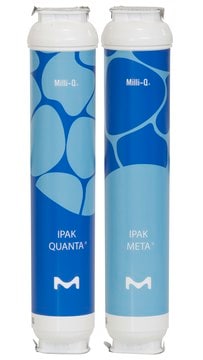MPGP002A1
Millipak® Filter
0.22 μm membrane filter for particulate and bacteria-free water at the point of dispense for the Milli-Q® IQ, IX and EQ 7 series water purification systems.
Synonym(s):
Millipak® 0.22 μm filter
About This Item
Recommended Products
material
polyethersulfone filter
Quality Level
packaging
pkg of 1 unit
manufacturer/tradename
Millipak®
pore size
0.22 μm pore size
compatibility
for use with Milli-Q® EQ 7000
for use with Milli-Q® EQ 7008
for use with Milli-Q® EQ 7016
for use with Milli-Q® IX 7003
for use with Milli-Q® IX 7005
for use with Milli-Q® IX 7010
for use with Milli-Q® IX 7015
for use with Milli-Q® IQ 7000
for use with Milli-Q® IQ 7003
for use with Milli-Q® IQ 7005
for use with Milli-Q® IQ 7010
for use with Milli-Q® IQ 7015
shipped in
ambient
Looking for similar products? Visit Product Comparison Guide
General description
The filter is designed with a 0.22μm PES (polyethersulfone) asymmetric membrane filter heat-sealed on a styrene-acrylonitrile housing that serves to minimize organic and inorganic extractable release.
Application
Features and Benefits
- Each Millipak® 0.22μm filter is individually tested, hermetically sealed and delivered with a Certificate of Quality.
- Validated to deliver bacteria-free water (<0.01cfu/mL when installed and used in a laminar flow hood).
- Carefree maintenance: Easily installed and replaced.
- Redesigned bottom-tip for a secured installation of the protection bell.
- Validated to deliver particulate-free water (no particles with size >0.22 μm)
- e-Sure tag for RFID connection with E-POD® or Q-POD® dispenser enables full traceability (data management) and automatic consumable status monitoring on the POD’s touchscreen interface.
Other Notes
- Organism Retention: Microorganisms
- Mode of Action: Filtering
- Application: General laboratory analysis
- Intended Use: Water purification
- Instructions for Use: This item provides water filtered through 0.22 ?m sterilizing-grade membranes. Refer to the system equipment user guide section "Using the System" (available on USB key in the system box).
- Storage Statement: Store in a dry location
- Disposal Statement: Dispose of in accordance with applicable federal, state and local regulations.
Legal Information
also commonly purchased with this product
Certificates of Analysis (COA)
Search for Certificates of Analysis (COA) by entering the products Lot/Batch Number. Lot and Batch Numbers can be found on a product’s label following the words ‘Lot’ or ‘Batch’.
Already Own This Product?
Find documentation for the products that you have recently purchased in the Document Library.
Customers Also Viewed
Our team of scientists has experience in all areas of research including Life Science, Material Science, Chemical Synthesis, Chromatography, Analytical and many others.
Contact Technical Service













